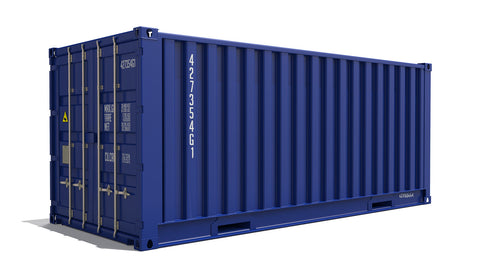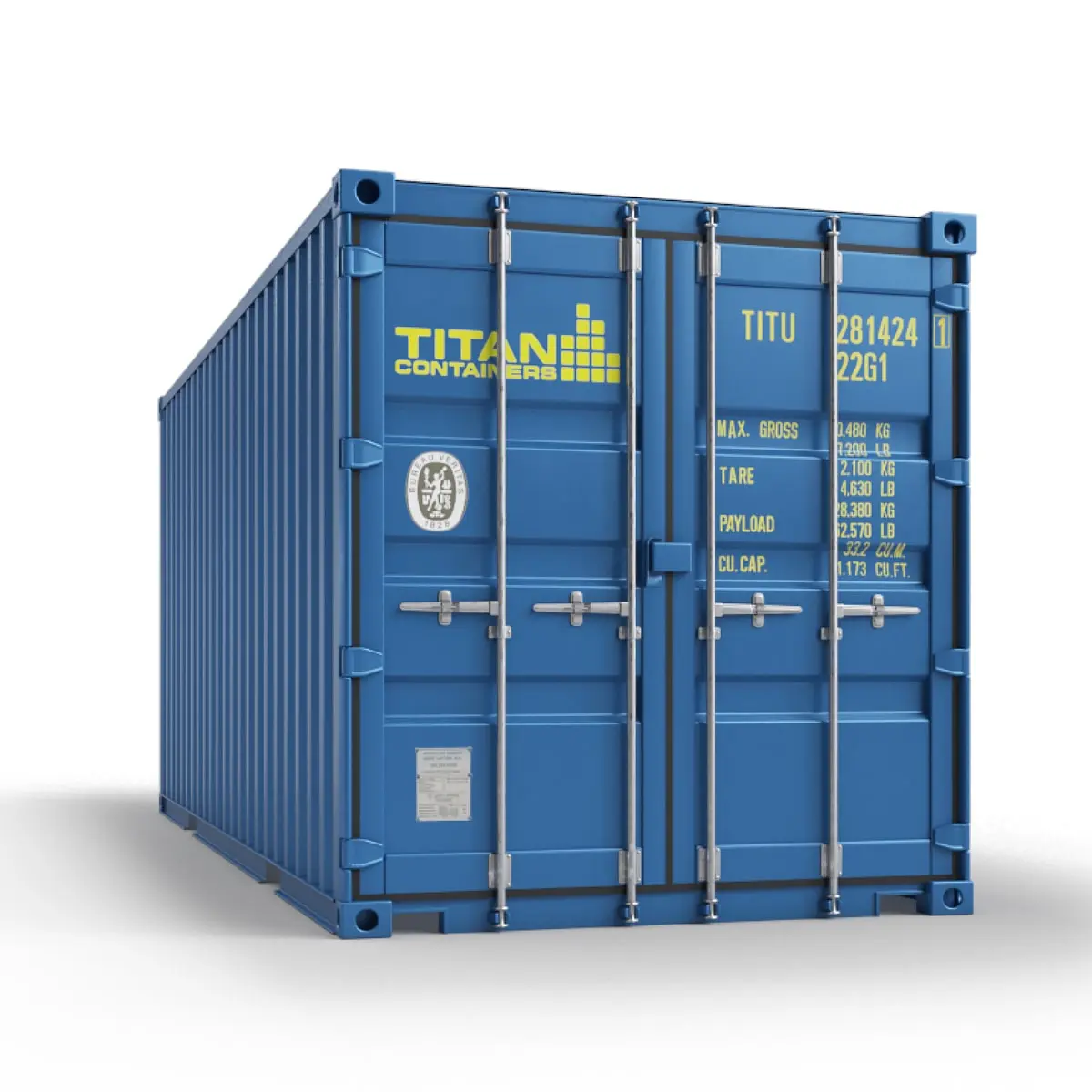Whatever You Need to Know About Shipping Containers and Their Practical Applications
Shipping containers have developed from plain devices for transportation to versatile frameworks with numerous sensible applications. Their robust style and common sizing make them optimal for a range of uses beyond delivery. From ingenious real estate services to lasting farming, their flexibility is significant. Yet, the opportunities do not end there. Exploring their different features discloses unexpected understandings into imaginative options and modern obstacles. What other functions could these containers play in today's world?
The Style and Framework of Shipping Containers

Inside, containers are made to maximize area, often including wood or steel floor covering that can support substantial weight. Ventilation systems may be included to stop moisture buildup, which is vital for delicate freight. Additionally, reinforced edges enable very easy handling by cranes and forklifts, helping with smooth loading and unloading. This thoughtful design and structure add to the containers' flexibility throughout different shipping and storage space applications.
Benefits of Using Shipping Containers
While many transportation techniques have their benefits, using shipping containers attracts attention because of their unparalleled flexibility and effectiveness. Shipping containers offer a standard size, making them very easy to stack and move throughout numerous settings of transportation, including ships, vehicles, and trains. This standardization lowers loading and discharging times, thus raising general productivity.
Additionally, shipping containers are constructed from resilient products, providing durable defense for goods during transit. They are safe and weather-resistant, reducing the threat of damages from ecological elements or burglary. In addition, the modular design of delivery containers enables very easy modification, allowing businesses to adapt them for various objectives, such as storage space or mobile workplaces.
Their mobility and cost-effectiveness make delivery containers an eye-catching choice for services looking to enhance logistics and supply chain operations. These benefits add to the expanding appeal of delivery containers in different industries.
Creative Real Estate Solutions With Shipping Containers
Cutting-edge real estate remedies have actually become an interesting application of shipping containers, leveraging their fundamental strengths for household usage. These functional frameworks offer a sustainable choice to typical building materials, commonly at a portion of the cost. Designers and designers have actually transformed containers into fashionable, useful homes, providing to varied way of lives and preferences.

Shipping containers are environmentally pleasant, advertising recycling and lowering waste. Numerous jobs concentrate on energy effectiveness, including photovoltaic panels and eco-friendly roofings. As urbanization boosts, these cutting-edge housing services present a functional reaction to housing scarcities while cultivating a distinct building visual.
Shipping Containers in Retail and Pop-Up Shops
An expanding number of sellers are turning to delivering containers as a vibrant option for pop-up stores and retail rooms. These flexible frameworks use an economical option to traditional storefronts, allowing companies to create one-of-a-kind, appealing settings that draw in customers. Their modular style makes it possible for simple transport and installment, making them optimal for short-lived or seasonal retail locations.
Merchants can tailor shipping containers to reflect their brand name identity, changing them into aesthetically appealing shops that stick out in congested industries. The portable nature of containers also encourages efficient usage of area, permitting for investigate this site innovative designs that enhance consumer circulation and involvement. Shipping containers can be situated in non-traditional places, such as vacant whole lots or urban parks, increasing availability and foot web traffic.

As the retail landscape advances, shipping containers provide a adaptable and innovative service that fulfills the demands of modern-day consumers while boosting the shopping experience.
Sustainable Farming Practices Using Shipping Containers
Lasting farming methods significantly incorporate delivery containers as ingenious remedies for farming - Shipping Containers. These container ranches make use of hydroponics to take full advantage of space and resource efficiency, using an economical technique to food manufacturing. By changing delivery containers into agricultural centers, farmers can address food safety and security and environmental worries at the same time
Container Farming Advantages
While standard agriculture faces difficulties such as land deficiency and environment adjustment, container farming offers a viable option that takes full advantage of space and resources. This ingenious approach permits year-round plant production in controlled settings, minimizing reliance on weather. Container ranches utilize less water than standard farming, promoting sustainability and this hyperlink preservation. They can be established in urban areas, bringing fresh produce closer to customers and decreasing transport discharges. Furthermore, the modular nature of shipping containers enables scalability, permitting farmers to adjust procedures based upon demand. Container farming also decreases chemical usage by producing an enclosed environment, eventually improving food safety and security. As metropolitan populaces expand, container farming becomes a sensible option to meet the enhancing demand for local, lasting food resources.
Hydroponics in Containers
Hydroponics, which permits plants to grow without soil by using nutrient-rich water, thrives within the boundaries of delivery containers, making it an excellent approach for city agriculture. These containers create a controlled setting that maximizes temperature, moisture, and light, enabling year-round growing. With limited room in urban locations, delivering containers use a scalable solution for expanding fresh produce. Hydroponic systems within containers can consist of numerous methods, such as nutrient film technique (NFT) and deep water culture (DWC), which make best use of yield while minimizing water usage. This ingenious technique not only improves food safety and security but also reduces the carbon footprint related to typical farming methods. Hydroponics in containers stands for a forward-thinking service for sustainable urban food manufacturing.
Cost-Effective Agriculture Solutions
As food production encounters raising difficulties due to climate adjustment and urbanization, delivering containers become a cost-efficient solution for farming. These functional structures can be repurposed for numerous sustainable farming methods, such as hydroponics and vertical farming. By using regulated environments within containers, farmers can optimize development cycles and lower resource intake, consisting of water and fertilizers. Additionally, delivering containers can be purposefully put in metropolitan locations, reducing transportation prices and improving accessibility to fresh produce. Their modular nature allows for scalability, making it possible for farmers to expand operations as demand expands. Furthermore, repurposing containers contributes to waste reduction, aligning with environmentally friendly farming campaigns. Overall, delivering containers present ingenious possibilities for reliable and sustainable food manufacturing.
Emergency and Catastrophe Relief Applications of Shipping Containers

Organizations often utilize shipping containers to produce mobile centers or field hospitals, making certain that clinical care gets to those in need. Additionally, they can be transformed right into command centers for working with rescue operations, consequently improving business effectiveness during crises.
In addition, containers can be changed to keep crucial products such as food, clothing, and water, safeguarding products up until they are distributed. Their movement enables them to be quickly moved to various places, ensuring that aid gets here where it is most urgently needed. In general, delivery containers play a pivotal function in boosting the performance of catastrophe alleviation efforts worldwide.
Often Asked Inquiries
Just How Are Shipping Containers Transported From One Area to Another?
Shipping containers are delivered through ships, trains, and vehicles, using cranes for unloading and loading. This multi-modal transport system makes certain efficient motion across land and sea, connecting worldwide supply chains and assisting in international trade.
What Is the Average Lifespan of a Delivery Container?
The average lifespan of a shipping container commonly varies from 10 to 25 years, depending upon upkeep, usage, and environmental elements. Correct care can prolong their functionality, while neglect may cause damage and damages.
Can Shipping Containers Be Changed for Different Usages?
Yes, delivering containers can be changed for numerous uses. They act as homes, offices, pop-up shops, and storage units. Their versatility permits creative adjustments, making them appropriate for a large range of applications.
Are Shipping Containers Ecologically Friendly?
Shipping containers can be eco-friendly, as they promote repurposing and recycling. Their durability reduces waste, while their usage in alternate real estate and companies reduces the demand for brand-new materials, adding to lasting techniques.
Just how Do I Select the Right Size Shipping Container?
To choose the right dimension delivery container, one should analyze storage space demands, take into consideration the designated use, and examine room accessibility - Shipping Containers for Sale. Usual sizes include 20-foot and 40-foot containers, each offering various storage and transport needs successfully
Ingenious real estate options have actually emerged as an interesting application of shipping containers, leveraging their intrinsic strengths for household use. The adaptability of shipping containers permits for creative designs, from single-unit homes to complex multi-container setups. Sustainable farming techniques significantly integrate shipping containers as cutting-edge services for farming. Furthermore, the modular nature of delivery containers makes it possible for scalability, permitting farmers to adjust operations based on demand. Hydroponics, which allows plants to grow without soil by utilizing nutrient-rich water, grows within the confines of delivery containers, making it an excellent approach for city agriculture.